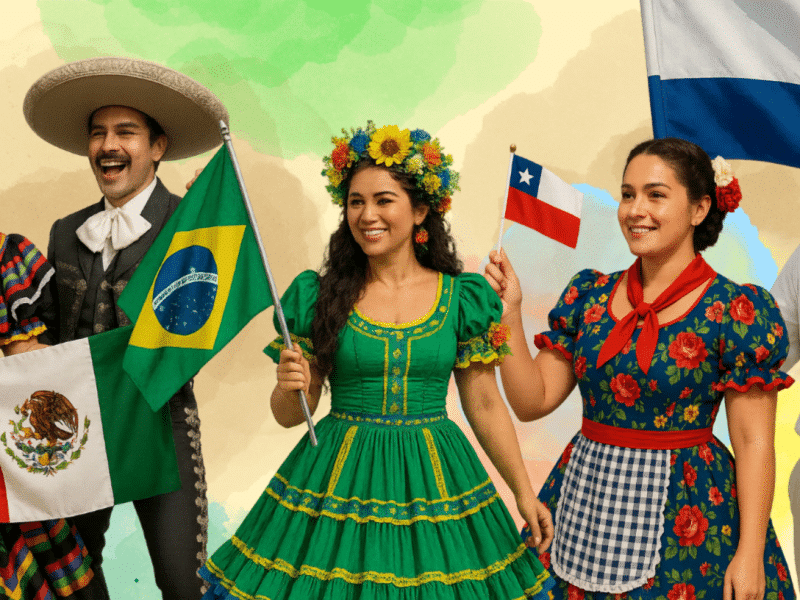Breaking Traditions: The Decline of Marriage Rates Among Latinas
Marriage once seemed like a given, but now? Not so much. Rates have tanked from 76.5% in 1970 to a mere 31% today.

In the United States, societal attitudes toward marriage are evolving, evidenced by a significant decrease in marriage rates – dropping from a robust 76.5% in 1970 to a more modest 47% as of 2022 – this trend spans various communities, including the Latino community, which is actively challenging conventional norms, reshaping roles, and forging new paths in their conceptions of love and family.
Challenging the Status Quo
Although there have been some changes in recent decades, Latino culture still holds onto many outdated traditions and rigid gender roles. Many Latinas report still feeling pressured by society and even their own families to get married early and start a family. These expectations are sometimes pushed by older women in the family who insist that their daughters embrace the roles of marriage and motherhood, even when their daughters have entirely different goals in mind. These women end up backing the patriarchal system without even realizing it; a phenomenon referred to as marianismo.
The marriage rate for Latinas has decreased significantly since the 1950s. Today, approximately 43% of U.S. Latinas are married, representing a 33% decline in marriage rates over the past 70 years. It’s worth noting that there are differences in marriage rates between U.S.-born and foreign-born Latinas. Among U.S.-born Latinas, the percentage of those married decreased from 51% in 1990 to 36% in 2017. For foreign-born Latinas, the marriage rate has remained relatively stable, declining only slightly from 62% in 1990 to 58% in 2017.
That the marriage rate has dropped so much in recent years is a clear indication that Latina women are challenging traditional gender roles, choosing to focus on their personal development, education, and career, sometimes before or even instead of marriage.
Independence and Choice
The decision of younger generations to not get married is meaningful, particularly when considering the significance of marriage in Latino culture for many years. The declining marriage rate mirrors how Latinas are reconciling their cultural traditions with more progressive ideas, leading to the creation of new collective views and realities.
Latina women are achieving unprecedented levels of education and workforce participation, giving them greater economic independence. This autonomy has expanded their life options. For new generations, marriage is no longer seen as the only route to stability and success, but as one of many options on a broader spectrum to achieve personal fulfillment.
Breaking this paradigm is also influenced by the multicultural environment of the U.S., where Latino traditions are merging with new ideas and dialogues that challenge traditional and outdated systems based on patriarchy, creating a contemporary reinterpretation of what it means to be a woman and being Latina in today’s society.
There are a few additional factors at play that have led to a decrease in marriage rates. One significant factor is the declining religious adherence to marriage. There’s also a growing trend of reduced enthusiasm for marriage among the general public that has contributed to this decline.
A Ripple Effect on Men and Society
As women gain more autonomy and redefine their roles, Latino men are also experiencing a change in their traditional roles. So, how are Latino men adapting? Are their views on marriage, family, and gender roles in these areas shifting too?
The answer tends to lean towards no. Men, in general, aren’t faring too well as women continue to increase their life and dating standards. A recent study of 46,054 people in 237 countries found that men are now more likely to be “lonely and single” than women, which wasn’t the case 30 years ago.
Greg Matos, PsyD, a couple’s therapist, wrote in “Psychology Today” that men are struggling to bridge the “relationship-skills gap” as women search for partners who are “emotionally available, good communicators, and share similar values.”
As men find new ways to participate in family life and relationships, the shift could lead to a reevaluation of masculinity within the Latino community. This change creates opportunities to challenge gender stereotypes and foster more equitable and collaborative relationships in maintaining a home and raising children.
The Future
The fact that fewer people are getting married than ever before indicates that social norms are changing. As a result, we are seeing the emergence of new family structures. The big question is: how is it going to affect the whole Latino cultural identity down the road?
We are already starting to see more single-parent families or non-traditional family arrangements. This shift could influence several aspects of daily life, including parenting, community support, and social safety nets.
The increasing participation of Latina women in higher education and the workforce is having a considerable impact on the domestic economy. The Latina GDP 2024 Report showed that Latinas contributed $1.3 trillion to the U.S. GDP in 2021 alone. This shift might make Latino families start to rethink how they handle their money, make investment choices, and decide on their spending priorities.
A New Latino Identity
The low marriage rates in the Latino community reveal a shift in gender dynamics, educational empowerment, and an ongoing interplay between traditional values and modern viewpoints in a multicultural setting. All these factors are shaping a new Latino identity.
The Latino community in the United States is not only adding to the country’s cultural diversity but also taking a lead in some of the most important discussions of our time regarding gender, culture, and identity. In an ever-changing world, adaptability, resilience, and the willingness to challenge the status quo are not only valuable but essential. And in this scenario, Latina women in the United States are, undoubtedly, at the forefront.
Now, more than ever, is the time to support independent Latina-owned media—your source for trustworthy news, authentic stories, and combating misinformation about our community. A gift of $25 or whatever you can will help us keep these stories alive.
💡 Together, we amplify truth. Together, we ignite change. #AmplifyLatinoTruth, donate today.



